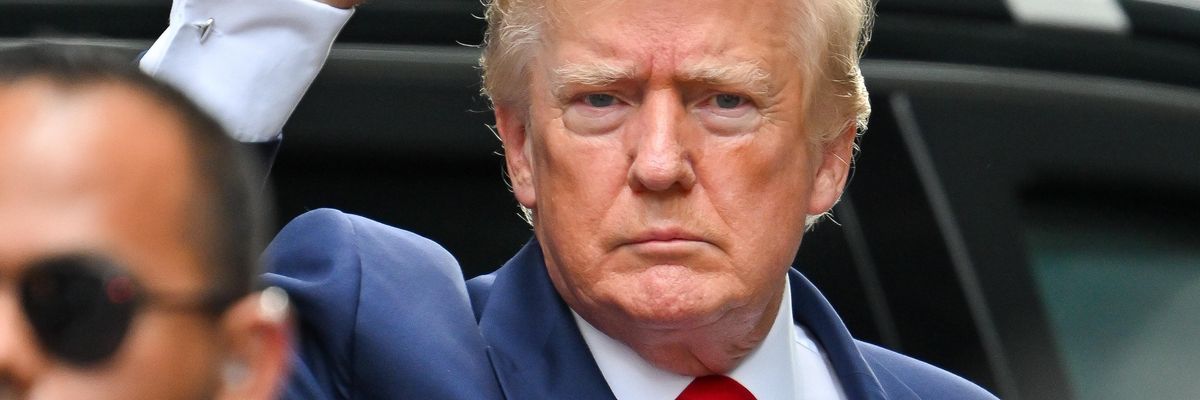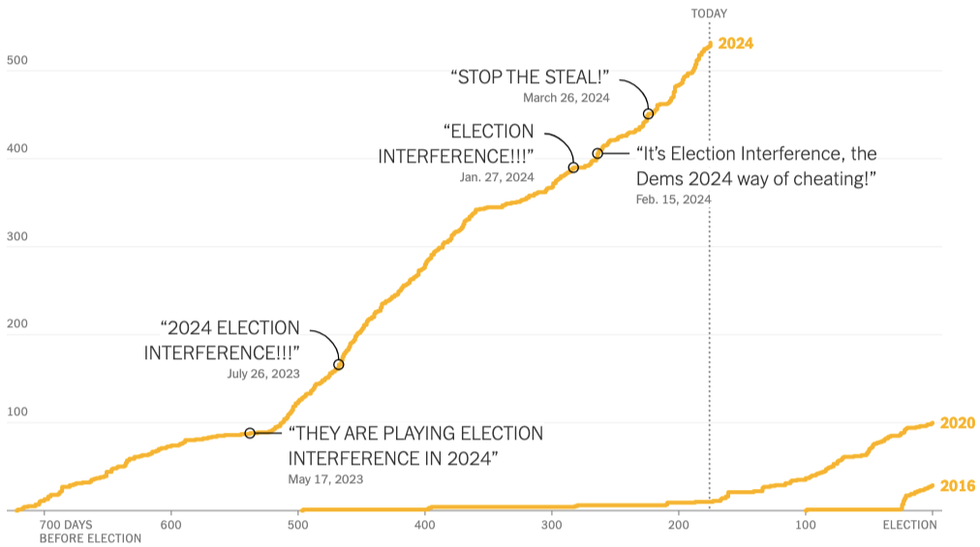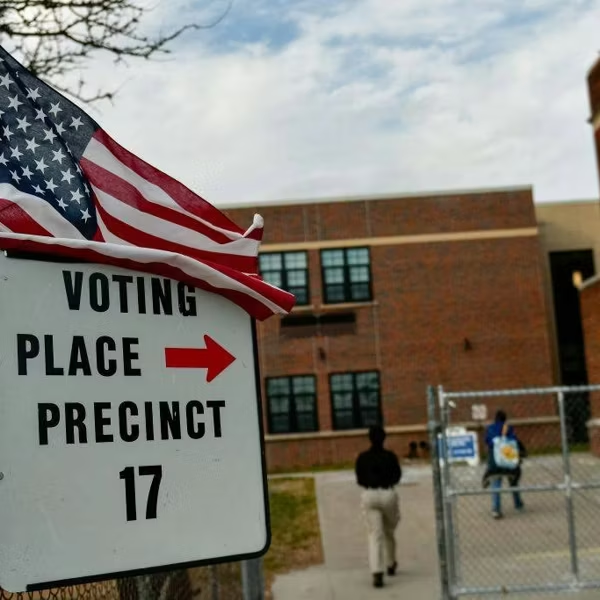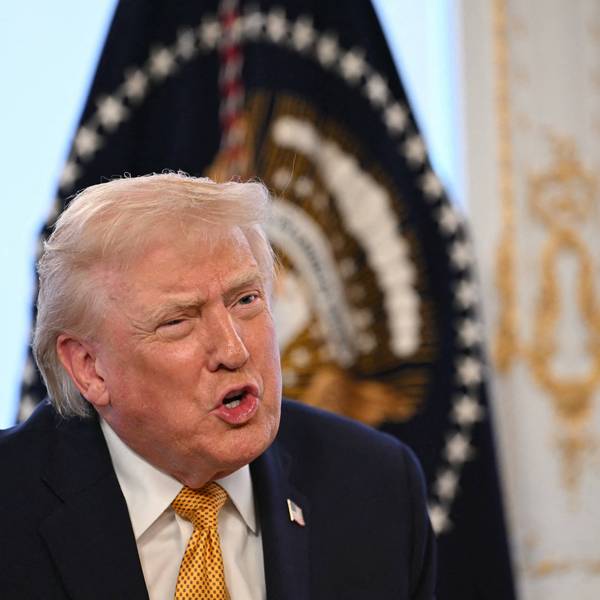
Presumptive Republican nominee Donald Trump has cast doubt on the fairness of the 2024 presidential election result about once per day, according to an analysis by The New York Times published on May 24, 2024.
Analysis Shows Trump's Escalated Talk of a 'Rigged' 2024 Election
Trump has cast doubt on the upcoming election's fairness about once per day since he announced his candidacy—engaging in a strategy The New York Times referred to as "heads, I win; tails, you cheated."
Presumptive Republican nominee Donald Trump has cast doubt on the fairness of the 2024 presidential election result significantly more than he had by this time in 2016 or 2020, according to an analysis published Friday in The New York Times.
The Times found more than 500 instances of Trump falsely accusing Democrats of trying to rig, cheat, or steal the 2024 election, or of having done so in 2020. This is a significant increase from the 2020 cycle, when Trump did so roughly 100 times, and 2016, when he did not begin regularly raising concerns about the election's legitimacy until the final weeks of his campaign against Hillary Clinton.
"Though the tactic is familiar—Mr. Trump raised the specter of a 'rigged' election in the 2016 and 2020 cycles, too—his attempts to undermine the 2024 contest are a significant escalation," the Times reported, based on its search of social media posts, interviews, and records of campaign events.

Trump has cast doubt on the upcoming election's fairness about once per day since he announced his candidacy—engaging in a strategy the Times referred to as "heads, I win; tails, you cheated."
Dean Baker, an economist at Center for Economic and Policy Research, referred to the Times' findings as a "big deal" on social media, while Ian Bremmer, a political scientist at Columbia University's School of International and Public Affairs, jokingly said, in response to the article, that 2024 was "off to a great start."
The Times analysis illustrates that in the 2024 cycle, Trump has broadened his argument about unfairness, suggesting not just that presidential elections are rigged against him but that the Democrats have a strategy of "election interference" that includes legal cases against him. After announcing his candidacy in November 2022, Trump began to argue that the legal cases against him "constituted a 'new way of cheating' in order to 'interfere' in the 2024 election," the Times reported. Trump called the appointment of a special counsel to investigate him a "rigged deal, just as the 2020 election was rigged."
In so doing, Trump has attempted to "undermine democracy" by conflating claims of a stolen election and claims of interference by means of legal action, argued Edward Foley, a constitutional law professor at Ohio State University, in Election Law Blog on Friday.
Turning to media criticism, Foley wrote that the Times repeated Trump's mistaken conflation in its new analysis. Though Trump collapses these arguments, the Times should not, he wrote, arguing that the analysis wrongly lumps together two distinct phenomena:
(1) Trump's false claim that he, not [President Joe] Biden, won more valid votes in enough states for 270 electoral votes in 2020, once allegedly fraudulent and thus unlawful votes are discounted, with (2) Trump's complaints that the electoral process is 'rigged' against him. Perhaps the most famous example of the first category is Trump's brazen assertion on Election Night that 'frankly, we did win this election.' An example in the second category, which the Times cites (without distinguishing it from the first kind of claim) is Trump's assertion that this year's election is 'rigged' because of the Biden [Department of Justice]'s prosecutions of him.
Trump is not alone in preemptively questioning the legitimacy of November's election results. Prominent Republicans are "already rushing to buy into Trump's 2024 election fraud narrative," CNN's Stephen Collinson wrote earlier Friday. Senators such as Ted Cruz (R-Texas), J.D. Vance (R-Ohio), and Marco Rubio (R-Fla.) have all failed to commit to honoring the election results despite the fact that "there is no indication that there will be irregularities in the election," Collinson wrote.
In fact, no leading contenders to be Trump's running mate—a list that includes Vance and Rubio—have committed to accepting the election results if Biden wins, according to NBC News.
Trump has hurt public confidence in elections, a pillar of democracy, in a way that will have long-term ramifications, Richard Hasen, a law professor at University of California, Los Angeles, wrote in Politico in January. "Without 'loser's consent'—when those on the losing end of an election accept the results as fairly determined—democracy falters. Trump has succeeded in undermining the foundation of that... pillar for everyone, whether or not he's victorious as a candidate in 2024," Hasen wrote.
An Urgent Message From Our Co-Founder
Dear Common Dreams reader, The U.S. is on a fast track to authoritarianism like nothing I've ever seen. Meanwhile, corporate news outlets are utterly capitulating to Trump, twisting their coverage to avoid drawing his ire while lining up to stuff cash in his pockets. That's why I believe that Common Dreams is doing the best and most consequential reporting that we've ever done. Our small but mighty team is a progressive reporting powerhouse, covering the news every day that the corporate media never will. Our mission has always been simple: To inform. To inspire. And to ignite change for the common good. Now here's the key piece that I want all our readers to understand: None of this would be possible without your financial support. That's not just some fundraising cliche. It's the absolute and literal truth. We don't accept corporate advertising and never will. We don't have a paywall because we don't think people should be blocked from critical news based on their ability to pay. Everything we do is funded by the donations of readers like you. Will you donate now to help power the nonprofit, independent reporting of Common Dreams? Thank you for being a vital member of our community. Together, we can keep independent journalism alive when it’s needed most. - Craig Brown, Co-founder |
Presumptive Republican nominee Donald Trump has cast doubt on the fairness of the 2024 presidential election result significantly more than he had by this time in 2016 or 2020, according to an analysis published Friday in The New York Times.
The Times found more than 500 instances of Trump falsely accusing Democrats of trying to rig, cheat, or steal the 2024 election, or of having done so in 2020. This is a significant increase from the 2020 cycle, when Trump did so roughly 100 times, and 2016, when he did not begin regularly raising concerns about the election's legitimacy until the final weeks of his campaign against Hillary Clinton.
"Though the tactic is familiar—Mr. Trump raised the specter of a 'rigged' election in the 2016 and 2020 cycles, too—his attempts to undermine the 2024 contest are a significant escalation," the Times reported, based on its search of social media posts, interviews, and records of campaign events.

Trump has cast doubt on the upcoming election's fairness about once per day since he announced his candidacy—engaging in a strategy the Times referred to as "heads, I win; tails, you cheated."
Dean Baker, an economist at Center for Economic and Policy Research, referred to the Times' findings as a "big deal" on social media, while Ian Bremmer, a political scientist at Columbia University's School of International and Public Affairs, jokingly said, in response to the article, that 2024 was "off to a great start."
The Times analysis illustrates that in the 2024 cycle, Trump has broadened his argument about unfairness, suggesting not just that presidential elections are rigged against him but that the Democrats have a strategy of "election interference" that includes legal cases against him. After announcing his candidacy in November 2022, Trump began to argue that the legal cases against him "constituted a 'new way of cheating' in order to 'interfere' in the 2024 election," the Times reported. Trump called the appointment of a special counsel to investigate him a "rigged deal, just as the 2020 election was rigged."
In so doing, Trump has attempted to "undermine democracy" by conflating claims of a stolen election and claims of interference by means of legal action, argued Edward Foley, a constitutional law professor at Ohio State University, in Election Law Blog on Friday.
Turning to media criticism, Foley wrote that the Times repeated Trump's mistaken conflation in its new analysis. Though Trump collapses these arguments, the Times should not, he wrote, arguing that the analysis wrongly lumps together two distinct phenomena:
(1) Trump's false claim that he, not [President Joe] Biden, won more valid votes in enough states for 270 electoral votes in 2020, once allegedly fraudulent and thus unlawful votes are discounted, with (2) Trump's complaints that the electoral process is 'rigged' against him. Perhaps the most famous example of the first category is Trump's brazen assertion on Election Night that 'frankly, we did win this election.' An example in the second category, which the Times cites (without distinguishing it from the first kind of claim) is Trump's assertion that this year's election is 'rigged' because of the Biden [Department of Justice]'s prosecutions of him.
Trump is not alone in preemptively questioning the legitimacy of November's election results. Prominent Republicans are "already rushing to buy into Trump's 2024 election fraud narrative," CNN's Stephen Collinson wrote earlier Friday. Senators such as Ted Cruz (R-Texas), J.D. Vance (R-Ohio), and Marco Rubio (R-Fla.) have all failed to commit to honoring the election results despite the fact that "there is no indication that there will be irregularities in the election," Collinson wrote.
In fact, no leading contenders to be Trump's running mate—a list that includes Vance and Rubio—have committed to accepting the election results if Biden wins, according to NBC News.
Trump has hurt public confidence in elections, a pillar of democracy, in a way that will have long-term ramifications, Richard Hasen, a law professor at University of California, Los Angeles, wrote in Politico in January. "Without 'loser's consent'—when those on the losing end of an election accept the results as fairly determined—democracy falters. Trump has succeeded in undermining the foundation of that... pillar for everyone, whether or not he's victorious as a candidate in 2024," Hasen wrote.
- Latest Indictment Against Trump Is Historic Rejection of Election Denial ›
- Opinion | Election 2024 Won’t Be a Trump/Biden Rematch; What’s Next? | Common Dreams ›
- Opinion | Can Election 2024 Move the US From ‘Learned Helplessness’ to ‘Learned Optimism?’ | Common Dreams ›
- Opinion | Beware he Republican Plot to Steal the 2024 Election | Common Dreams ›
- Opinion | How Trump Is Already Trying to Rig the 2024 Election | Common Dreams ›
Presumptive Republican nominee Donald Trump has cast doubt on the fairness of the 2024 presidential election result significantly more than he had by this time in 2016 or 2020, according to an analysis published Friday in The New York Times.
The Times found more than 500 instances of Trump falsely accusing Democrats of trying to rig, cheat, or steal the 2024 election, or of having done so in 2020. This is a significant increase from the 2020 cycle, when Trump did so roughly 100 times, and 2016, when he did not begin regularly raising concerns about the election's legitimacy until the final weeks of his campaign against Hillary Clinton.
"Though the tactic is familiar—Mr. Trump raised the specter of a 'rigged' election in the 2016 and 2020 cycles, too—his attempts to undermine the 2024 contest are a significant escalation," the Times reported, based on its search of social media posts, interviews, and records of campaign events.

Trump has cast doubt on the upcoming election's fairness about once per day since he announced his candidacy—engaging in a strategy the Times referred to as "heads, I win; tails, you cheated."
Dean Baker, an economist at Center for Economic and Policy Research, referred to the Times' findings as a "big deal" on social media, while Ian Bremmer, a political scientist at Columbia University's School of International and Public Affairs, jokingly said, in response to the article, that 2024 was "off to a great start."
The Times analysis illustrates that in the 2024 cycle, Trump has broadened his argument about unfairness, suggesting not just that presidential elections are rigged against him but that the Democrats have a strategy of "election interference" that includes legal cases against him. After announcing his candidacy in November 2022, Trump began to argue that the legal cases against him "constituted a 'new way of cheating' in order to 'interfere' in the 2024 election," the Times reported. Trump called the appointment of a special counsel to investigate him a "rigged deal, just as the 2020 election was rigged."
In so doing, Trump has attempted to "undermine democracy" by conflating claims of a stolen election and claims of interference by means of legal action, argued Edward Foley, a constitutional law professor at Ohio State University, in Election Law Blog on Friday.
Turning to media criticism, Foley wrote that the Times repeated Trump's mistaken conflation in its new analysis. Though Trump collapses these arguments, the Times should not, he wrote, arguing that the analysis wrongly lumps together two distinct phenomena:
(1) Trump's false claim that he, not [President Joe] Biden, won more valid votes in enough states for 270 electoral votes in 2020, once allegedly fraudulent and thus unlawful votes are discounted, with (2) Trump's complaints that the electoral process is 'rigged' against him. Perhaps the most famous example of the first category is Trump's brazen assertion on Election Night that 'frankly, we did win this election.' An example in the second category, which the Times cites (without distinguishing it from the first kind of claim) is Trump's assertion that this year's election is 'rigged' because of the Biden [Department of Justice]'s prosecutions of him.
Trump is not alone in preemptively questioning the legitimacy of November's election results. Prominent Republicans are "already rushing to buy into Trump's 2024 election fraud narrative," CNN's Stephen Collinson wrote earlier Friday. Senators such as Ted Cruz (R-Texas), J.D. Vance (R-Ohio), and Marco Rubio (R-Fla.) have all failed to commit to honoring the election results despite the fact that "there is no indication that there will be irregularities in the election," Collinson wrote.
In fact, no leading contenders to be Trump's running mate—a list that includes Vance and Rubio—have committed to accepting the election results if Biden wins, according to NBC News.
Trump has hurt public confidence in elections, a pillar of democracy, in a way that will have long-term ramifications, Richard Hasen, a law professor at University of California, Los Angeles, wrote in Politico in January. "Without 'loser's consent'—when those on the losing end of an election accept the results as fairly determined—democracy falters. Trump has succeeded in undermining the foundation of that... pillar for everyone, whether or not he's victorious as a candidate in 2024," Hasen wrote.
- Latest Indictment Against Trump Is Historic Rejection of Election Denial ›
- Opinion | Election 2024 Won’t Be a Trump/Biden Rematch; What’s Next? | Common Dreams ›
- Opinion | Can Election 2024 Move the US From ‘Learned Helplessness’ to ‘Learned Optimism?’ | Common Dreams ›
- Opinion | Beware he Republican Plot to Steal the 2024 Election | Common Dreams ›
- Opinion | How Trump Is Already Trying to Rig the 2024 Election | Common Dreams ›

